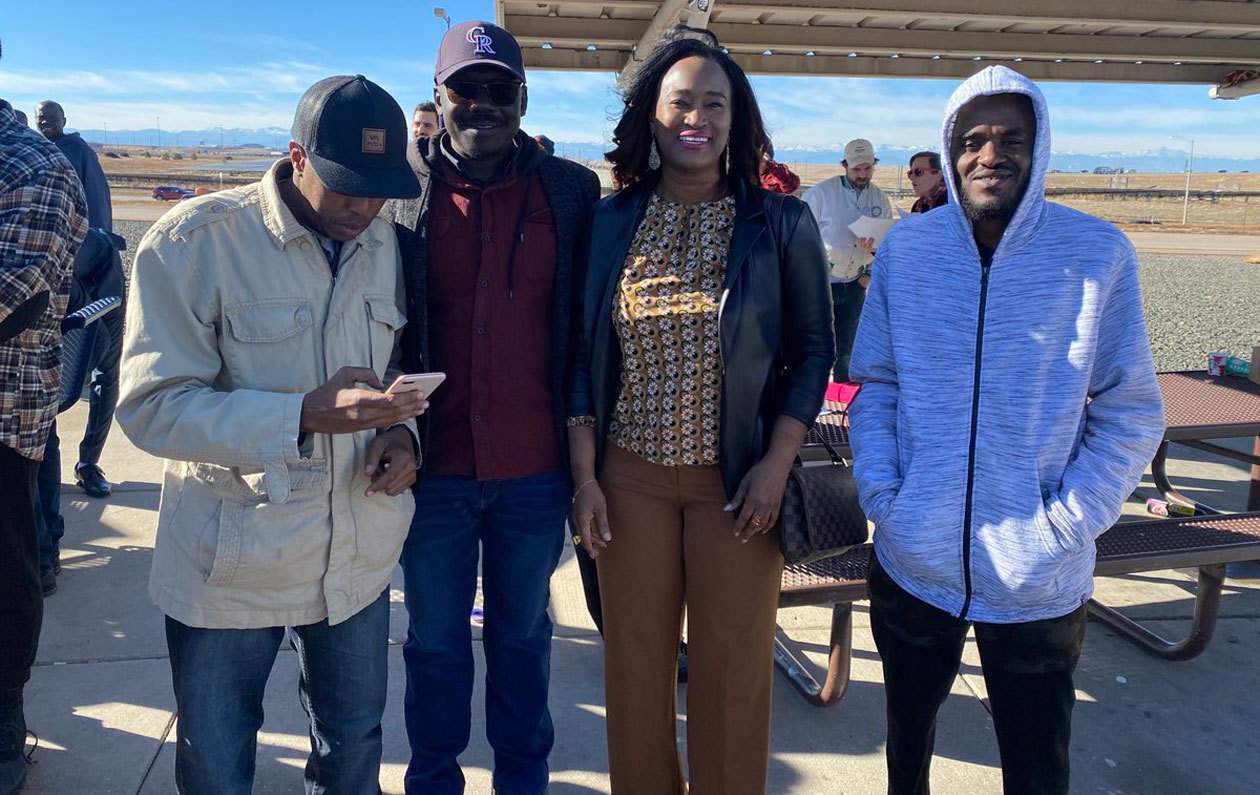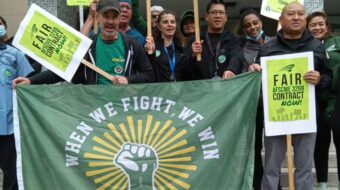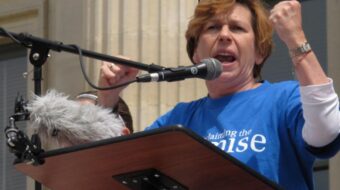
DENVER—”We don’t feel like being exploited anymore,” said Steven Lustig, an Uber driver and union organizer. On Thanksgiving weekend, Lustig and 150 drivers organizing with Colorado Independent Drivers United (CIDU) switched off their mobile rideshare apps and put on red armbands. The Lyft and Uber drivers’ half-day work stoppage at Denver International Airport last Saturday was timed to coincide with peak holiday air traffic. It was their first-ever strike action.
“We feel like as drivers, these companies are kind of taking advantage of us. We’re trying to put food on the table,” said Lustig.
Organizers claimed “near-total” participation in the strike on the high-volume airport market. At one point, strikers reported that only five or six drivers were logged on to accept rides, when normally upwards of seventy would be reporting for work at the terminals.
Drivers cited the opaque and exploitative algorithms that determine their per-ride payouts as a major motivator of their action. They told People’s World that drivers used to receive as much as 75% of fares paid by customers, but as the years have gone on, the platforms have jacked up their surcharge to the drivers. Now the rideshare companies keep up to two-thirds or more of fares paid. The apps block drivers from seeing the total fares paid to the company. They have discovered the steadily growing gap between their product and earnings by conferring with passengers to discover their portion of the fare.

In June of 2014, Colorado became one of the first states in the nation to pass legislation regulating transportation network companies (TNCs) like Uber and Lyft, standardizing requirements for drivers and rideshare companies alike to conduct business in the state. The legislation includes provisions requiring TNCs to disclose to both drivers and passengers the portion of fares paid out to the workforce — and the corresponding portion withheld by the company.
However, for eight years, the fare transparency provisions of the TNC act have gone entirely unenforced by Colorado’s Public Utilities Commission (PUC). Uber and Lyft repeatedly refuse to comply with the TNC fare disclosure policies, but have not faced regulatory enforcement. Drivers are left with an inscrutable formula that now enables the company to take as much as sixty to seventy or more percent of fares paid by customers.
In early October, CIDU brought hundreds of drivers and supporters to march from the state capitol in Denver to the nearby PUC office to demand immediate enforcement of the TNC regulations. PUC officials locked their doors and refused to meet with the union. Undeterred, drivers resolved to keep fighting: “We’ll be back,” they vowed.
“We drive this economy”
At 10:00 AM sharp Nov. 26, striking workers and their supporters blanketed the airport’s on-site commercial rideshare parking lot with the blare of their car horns. Workers shut off their apps and set up a strike line. Signs at the demonstration demanded a return to a 25% cap on the corporate cut of drivers’ fares, the enforcement of the TNC Act of 2014, an end to discriminatory deactivations, for gas surcharges, and the call to put “people over profit.”
Drivers canvassed the parking lot, rallying newcomers to join the strike. Many drivers who were unaware of the action until they arrived turned their apps off in solidarity after being told the reasons for the strike. While the mass work-stoppage triggered “surge pricing,” enticing other rideshare workers from the metropolitan area to head to the airport for more lucrative work, many nevertheless joined in the strike despite the potential profits of scabbery.
An extremely multinational workforce, rideshare drivers from every continent participated in the action. Speaking Nepali, Igbo, Swahili, Arabic, Burmese, German, Spanish, and more, drivers shared with each other examples of exploitative fare-rates paid out more and more sparsely each year and debated the best tactics to use against the companies going forward.
Addressing the immigrant-majority strike line, Colorado State Representative Naquetta Ricks (HD-40) condemned the “racist, discriminatory” practice of administrative “deactivations,” and pledged to fight for legislative reform to protect rideshare drivers. Ricks, who fled the civil war in Liberia as a teenager, is the first Black immigrant elected to the state Legislature. She stressed the need to fight for all immigrant workers in every sector. “We must fight to ensure that all workers are treated fairly in Colorado,” she said.
Sondra Young of the Denver chapter of the NAACP and Julie Gonzalez of SEIU Local 105 also pledged to mobilize their memberships to support CIDU.
Colorado Independent Drivers United was established in 2020 within Local 7777 of the Communications Workers of America. It has quickly grown to include hundreds of rideshare and delivery drivers across all major platforms. While rideshare and delivery workers saw consumer demand on the gig economy explode throughout the pandemic, they have earned less and less of the revenues that make the platforms profitable.
Strike organizers stressed their strategy to build political power as a union, citing the success of the rideshare workers’ movement in Seattle in winning a flat per-mile minimum wage rate enforced by city ordinance.
CIDU has taken steps to build political leverage above and beyond their power behind the driver’s seat. Earlier this month, rank-and-file CIDU member Stephanie Vigil was elected to represent Colorado House District 16 in Colorado Springs. Vigil joins a rising cohort of working-class, socialist, and pro-labor candidates poised to join the state Legislature in the new session, bolstering a broad Democratic supermajority able to deliver policy wins for the union movement — if they dare. Vigil celebrated her election win this month while acknowledging the big fight ahead: “We have a lot — a LOT, a lot – to do to hold big tech accountable and make sure the future of work puts people before profit.”
While the strike wound down, dozens of drivers signed union cards and dues authorization forms. One driver who spoke asked the others to each recruit five drivers who did not know about the union. “If you pull a bucket of water out of the ocean, does the ocean know it? No. We have to get every driver in the union for this to work,” he added.
As real wages buckle under the pressure of inflation, more and more workers across industries take on gig work in the rideshare sector to supplement their stagnating incomes. State employees and professionals are no exception to this trend, and even clergy have been proletarianized into the startup sector. For example, Pastor Robert from the Sudanese diasporic Christian Church spoke at the strike on behalf of his congregation — and his fellow drivers: “I’m not just here because I want to be here. I’m an Uber driver. I’m driving like you. One week ago, I had a customer — I was paid $5.59. I asked the customer, ‘How much did you pay?’ She told me, $12.59.” The pastor urged drivers in the crowd to not be afraid to fight fare-gouging with “union power,” and quoted from scripture to condemn the “injustice” of the TNCs’ exploitative practices.
In response to requests for comment from news agencies, Uber dismissed the drivers’ grievances, claiming that their employees make as much as $37 per hour in the Denver area. But a study conducted earlier this year by Jobs with Justice found that drivers in the city make an average of only $5.49 per hour, less than a third of the city’s $17.29 minimum wage scheduled to take effect in January.
The police and airport administration have engaged in union-busting intimidation in recent months. Days before the strike, Denver Police Department officers sent photographs of license plates of workers affiliated with the union to Uber — and even inadvertently included some who were unaffiliated. Uber in turn threatened all to discontinue their ability to sell rides on the platform. And airport security have prevented drivers from discussing their wages and conditions of employment together on premises, heckling organizers and threatening to summon the police.

Besides company and police backlash, rideshare drivers suffer from their classification as “independent contractors,” which allows their respective platforms to skirt the legal obligations of employers, such as minimum wage compliance, and to deny their workforce’s collective bargaining rights. In turn, CIDU has made the fight for fair classifications a cornerstone of its political strategy.
Sectoral union, sectoral power
The Communications Workers of America is pursuing a bold strategy of sectoral-scale organizing across industries. In Denver, the fruits of that trans-sectoral approach seem promising. Historically there have been tensions between workers at the app-based startup platforms and the older taxicab industry. The tensions are grounded in economic anxieties and differences in credentialing practices, but taxi drivers present for the action Saturday expressed their support and consciousness of a shared cause.
“I fully stand with Uber and Lyft drivers today. I was a driver for Lyft until I got deactivated and despite it being no fault of my own, they never called me for my side of the story,” said Medhane, a taxicab operator from Ethiopia who came to support the strike. He recounted how the unilateral suspension of his driving permissions at Lyft left him deeply indebted for his vehicle, forcing him to drive a taxi to pay off the interest. “Many of us taxi drivers have similar stories.”
The Communications Workers of America have organized hundreds of local taxi drivers in recent years, as well as dispatchers and clerks at First Transit, positioning the union to coordinate action and bargaining throughout the transportation economy. Other union workers with the CWA also had a part in the action. Broadcast technicians with the NABET-CWA were live on site with news crews to get the word out to the public about the strike.
While only a minority of the metropolitan area’s five thousand rideshare drivers are formally organizing with CIDU, the union signs up new members every day, tapping into near-universal outrage with working conditions and pay.
One driver noted that he had completed more than 25,000 rides for the company over the last decade, but instead of having his seniority compensated he continues to face rate cuts. Recent hires complained of the costly leases they’ve taken out on new cars that meet Uber’s ever-changing vehicle standards. But all the drivers on strike agreed that they needed to struggle to win back a greater share of the fares they produce.
Hamouda Ahmed, a five-year driver with both Lyft and Uber, vowed to continue the fight as long as it takes: “We’ll never stop — until Uber is going back to 25%,” he told People’s World.












Comments